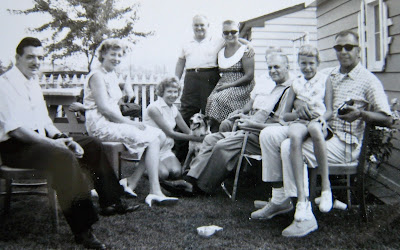As a child, I equated her loud voice and strong opinions with power, not having learned yet that it sometimes means just the opposite. Still, Aunt Steph was perhaps my earliest model for an outspoken woman. She cut a fine figure too--usually wearing a body-hugging dress and heels to family affairs. Her presence was never unnoticed, and I always looked forward to seeing her. Not just for the five bucks. I was fond of her and perhaps a little in awe, shy little girl that I was.
Steph, often called Stefka by her siblings, was the second child of Leon and Barbara, born in November of 1911. I know very little about her early life, other than she was born at home and did not finish high school. She went to work at Mercoid, like her older sister Marie (Myne-ka), and her earnings no doubt helped keep the family afloat during the Depression. She was a dark-haired beauty in her youth (and later as a blonde), and was named the Mercoid May Queen in 1940. (Factories had May queens? you may wonder, as do I).
Stephanie married a quiet man, a bartender named Frank Mack. They had no children, and Frank died of cancer in the early 60s. Later, Steph partnered with a co-worker, Ronnie Wronski, though they never married and the relationship ended after several years. Ronnie had become a friend of the family during Frank's lifetime and you can see all three of them here, along with other family members, in this photo, circa 1960. Taken in the backyard of the Hammond, Indiana home where my sister Joan and I grew up, this photo shows (from left): Ronnie Wronski, Steph, Kitch, Jack Beck, Marie Beck, Frank Mack, Joan Riley and Edward Bogdanski.
After Steph and Ronnie separated, Steph remained in Chicago, living alone, until the mid-70s. It was then that she and my mom, Angie (Anielka) moved into an apartment on the northwest side. They called themselves "the odd couple": Angie liked good books, plain wholesome food, and simple comfortable clothes. Steph, (who "likes everything fried", Angie once confided), was fond of The National Enquirer, and quiz shows. But they both kept a neat house and kept each other good company--at least in the beginning.
By the time Angie and Steph moved in together, I was living in Colorado, but made regular visits back to their home every summer. One year, on a visit back from Colorado, I drove them to the country home of their youngest sister, Virginia (Gina), near Toledo, Ohio. Here they are, circa 1985, "the girls", as Gina called them, waving to the camera.
I got to know Steph better on those visits. I asked her once how she felt about her job at Mercoid, which she kept for 40-plus years, until she retired at the age of 72. She had been a "floor lady" at one point. She told me that she was proud that the electrical parts she made were used all over the world. I don't know that Steph ever had hobbies, but she enjoyed dressing up, going downtown, visiting department stores like Marshall Fields, and eating at Berghoff's Restaurant. She loved fine food, a highball or two, and always took pride in her appearance. She was also proud that she had what she considered good Polish skills, having once been a secretary for a Polish organization.
Steph never had children, she said, because she had a "tipped womb". Perhaps there were other reasons, as that condition is not considered a barrier to fertility, I later learned. I never had the sense that she missed being a mother of young children, but later, when her nieces and nephews were grown, she spoke of her regret at not having had kids. Toward the end of her life, when she was in the Alden nursing home with advanced dementia, she was convinced that Joan and I were her children, and perhaps we were in a sense. Joan, especially, as she and her husband Jim navigated Steph's medical issues until Steph died in 2002.
Steph was devastated when Angie, her younger sister by 6 years, died suddenly of a heart attack in 1994. Both had suffered some health issues in the last few years, and Steph had become fearful, which caused Angie stress. After Angie's death, Steph coped for a few years on her own in the apartment they had shared, but after a fall and an injury, she was moved to Alden, By then, dementia had set in, and she could no longer live on her own. Joan and I and others visited her there until her death. She was not an easy patient/resident, being confined to a locked ward and being a smoker. On my visits I would take her to the patio to smoke. Conversation was difficult, and one time, at one poignant moment, she opened a compact in her purse, looked at herself and said, "How did I become a hag?" More than anything, this broke my heart, for this once-proud and attractive woman.
Steph would have shuddered at the idea of living to 110, which she would be on Nov. 26 this year. "I want to go like Marilyn Monroe," she used to say more than once, referring to that star's death from an overdose of sleeping pills. Yet I doubt she would have ever taken steps to end her life, even knowing the coming end. Had she been asked, I think she would have agreed the end should be left up to God, as was the beginning and everything in between.



